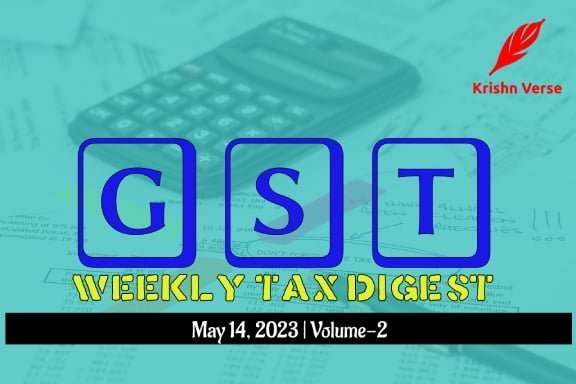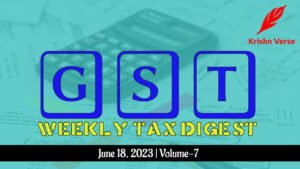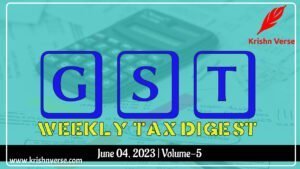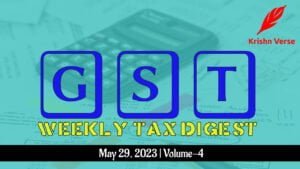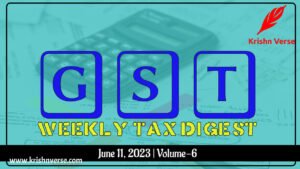Prepare yourself for an enlightening read with the GST Weekly Digest May 2023 Vol-2! Stay informed and stay ahead with the most recent tax updates, news, and insightful analysis. This edition encompasses a wide range of topics, including the latest decisions from the GST council meetings, updates on GST returns, e-invoicing, and much more. Stay ahead of the curve and remain well-informed with our comprehensive weekly digest!
Digest Period: 07/05/2023 to 13/05/2023
GST Monday, 08th May, 2023

Unified GST Audit Norms for Centre and States: Ensuring Consistency from this Fiscal Year
The Model All India GST Audit Manual 2023 is a finalized document that aims to support businesses, reduce legal disputes, and ensure consistency among tax officials.
It provides guidelines for various stages of the audit process, including case selection, conducting audits, and post-audit follow-up.
The manual suggests the establishment of a shared platform for audit findings and relevant information, as well as enhancing the skills and knowledge of tax officials through training programs. Its primary objective is to address the challenges posed by multiple audit procedures and promote the expansion of the GST taxpayer base while combating tax evasion.
To facilitate coordination, an All-India Coordination Committee of Officers will oversee audit themes, taxpayer selection, and collaboration among audit authorities.
By following the guidelines outlined in the manual, both taxpayers and audit teams can benefit from effective and comprehensive audits. The manual also recommends a standardized process for case selection, taking into account factors like weightage criteria and secondary data sources.
For follow-up audits, it emphasizes the timely payment of identified amounts. Failure to comply within 30 days may lead to recovery proceedings initiated by the respective jurisdiction.

Important Update for Delhi Taxpayers: Extension of Time for Scrutiny of GST Returns
The Delhi GST Department has issued a circular (F.3/432/GST/Policy/2022/582-89) dated May 08, 2023, regarding the time limit for scrutinizing GST returns. According to Section 73(10) of the DGST Act, the Proper Officer must issue an order within three years from the due date of the annual return or erroneous refund.
The Central Board of Indirect Taxes & Customs (CBIC) has extended the time limit for issuing these orders for the following financial years:
1. 2017-18: Extended until December 31, 2023.
2. 2018-19: Extended until March 31, 2024.
3. 2019-20: Extended until June 30, 2024.
To complete the scrutiny process, which takes approximately 5 to 6 months, Ward In charges / Proper Officers are advised to ensure timely issuance of orders (under Section 73(9)) based on the specified timelines mentioned in the CBIC’s notification (No. 9/2023 Central Tax, dated March 31, 2023).

CAIT’s Appeal: Lower GST on Beverages to Support Small Retailers’ Growth
To help small retailers thrive, the Confederation of All India Traders (CAIT) is urgently requesting a reduction in the Goods and Services Tax (GST) rate on beverages. The current rate of 28%, plus an additional cess of 12%, creates a heavy tax burden that hampers the working capital of small retailers.
CAIT proposes an innovative solution called the Sugar Based Tax (SBT) system. This system suggests that beverages with higher sugar content should be taxed more, while those with low or no sugar should have reduced tax rates. By implementing this approach, small retailers will have more capital to invest, increase their sales, and increase their incomes. Notably, this will also lead to significant cost savings for consumers.
CAIT plans to launch a campaign involving various stakeholders such as farmers, transporters, small businesses, women entrepreneurs, consumers, and street vendors. By uniting these sectors, CAIT aims to put pressure on both the central and state governments to lower the tax rates on beverages.
This proposal aligns with the recommendations of the 2023 Economic Survey, which emphasizes the importance of shifting from food security to nutritional security. CAIT emphasizes that beverages should not be subjected to “sin tax” since they are not luxury items or demerit products.
Praveen Khandewal, the Secretary General of CAIT, highlights the positive outcomes of rationalizing the GST tax rate. By reducing the tax burden, small retailers can experience increased turnover, resulting in higher revenue for the government.
Through their determined call for change, CAIT aims to create a brighter future for small retailers, fostering growth and prosperity across the nation.

Amendment to Import Policy for Apples: Prohibition and Minimum Import Price Exemption
The DGFT has made changes to the import policy for Apples through Notification No. 5/2023 dated May 08, 2023. The import policy condition for Apples under ITC (HS) 08081000 of Chapter-08 of ITC (HS), 2022, Schedule-I (Import Policy) has been amended.
According to the amendment, the existing policy of “Free” import for Apples has been revised to “Prohibited.” However, if the CIF value is above ₹50/- per kilogram, the import remains “Free.” The Minimum Import Price (MIP) conditions do not apply to imports from Bhutan.
This notification signifies that the import of Apples under ITC (HS) 08081000 is prohibited if the CIF Import Price is less than or equal to ₹50/- per kilogram. Imports from Bhutan are exempt from Minimum Import Price (MIP) conditions.
GST Tuesday, 9th May, 2023

Maharashtra and Karnataka Lead GST Collections in April 2023, Reports Finance Ministry
According to recent data from the Finance Ministry, Maharashtra and Karnataka emerged as the major contributors to Goods and Services Tax (GST) collections in April 2023. Maharashtra recorded the highest GST collection of ₹ 33,196 crore, followed by Karnataka with ₹ 14,593 crore. These figures mark the highest revenue generated since the inception of the GST regime six years ago.
Joining the ranks of GST collection champions are notable states like Gujarat, emerging with an impressive contribution of ₹11,721 crore. Tamil Nadu, Uttar Pradesh, Haryana, and Delhi followed closely, showcasing their financial prowess with collections of ₹11,559 crore, ₹10,320 crore, ₹10,035 crore, and ₹6,320 crore, respectively. Telangana, Odisha, and Rajasthan also made their mark with significant figures of ₹5,622 crore, ₹5,036 crore, and ₹4,785 crore. Not to be outdone, Andhra Pradesh and Madhya Pradesh joined the ascent by demonstrating remarkable improvement in their GST collections.
In April 2023, the GST collection grew by 12% compared to the previous year, reaching a total of ₹1.87 lakh crore. The revenue includes CGST (₹38,440 crore), SGST (₹47,412 crore), IGST (₹89,158 crore, including ₹34,972 crore from import of goods), and cess (₹12,025 crore, including ₹901 crore from import of goods).
The government has settled ₹45,864 crore to CGST and ₹37,959 crore to SGST from IGST. After the regular settlement, the total revenue for the Centre and the States in April 2023 stands at ₹84,304 crore for CGST and ₹85,371 crore for SGST.
The GST revenues in April 2023 recorded a 12% increase compared to the same month last year. Domestic transactions, including import of services, contributed 16% more revenue than in April of the previous year. Additionally, the month witnessed a record-breaking tax collection of ₹68,228 crore on a single day, specifically on April 20, 2023, through 9.8 lakh transactions, surpassing the previous year’s highest single-day payment of ₹57,846 crore through 9.6 lakh transactions.
Moreover, the month of March 2023 saw a significant rise in the number of e-way bills generated, reaching 9.0 crore, an 11% increase from the 8.1 crore e-way bills generated in February 2023.

Finance Ministry Refers Insurers’ GST Violation Case to Regulatory Authority
According to reports, the Finance Ministry has redirected the matter to the Insurance Regulatory and Development Authority of India (IRDAI) instead of taking direct action. The case involves insurers and intermediaries allegedly evading taxes worth ₹2,000 crore.
Insurers had sought relief from penal action related to Goods and Services Tax (GST) input tax credit violations, but the Finance Ministry declined to intervene. The matter has now been referred to IRDAI for further investigation, as per sources familiar with the situation.
Last month, the insurance industry appealed to the Finance Ministry to consider the industry-wide commission practice leniently and not treat the violations as deliberate evasion. In a joint letter signed by 22 insurers and intermediaries, they also requested relief from summonses and hefty penalties.
An official stated that the Finance Ministry cannot interfere in the investigation and advised the concerned parties to approach IRDAI, the authority responsible for commission-related matters.
The tax authorities have accused insurance companies of claiming input tax credit (ITC) without actual supply of goods and services, based on fake bills provided by insurance intermediaries.
In their defense, insurance companies argue that commission structures for intermediaries vary and are not uniform across the industry.
GST Wednesday, 10th May, 2023

Deadline Extended for Goods Transport Agencies to Opt for GST Payment Method
Under the Goods and Services Tax (GST) system, Goods Transport Agencies (GTAs) have been granted an extension until May 31 to choose their preferred method of paying GST for the current fiscal year. GTAs can opt to pay GST on a forward charge basis, where they collect and pay the tax themselves, or under the reverse charge mechanism, where the recipient of the service becomes liable for payment.
To select the forward charge option for GST payment at either 12% (with input tax credit) or 5% (without ITC benefits) for a fiscal year, GTAs need to complete a form called Annexure V by March 15 of the previous financial year. The recent amendment to the GST Act states that the option for the financial year 2023-2024 should be exercised by GTAs on or before May 31.
Additionally, the amendment allows newly registered GTAs or those crossing the registration threshold during a financial year to exercise the option for themselves to pay GST on the services they provide. They must make a declaration in Annexure V within 45 days of applying for GST registration or one month from the date of obtaining registration, whichever is later.
The forward charge method enables taxpayers to utilize tax credit and pay tax only on the net value difference, while the reverse charge mechanism eliminates the need for detailed record-keeping and frees up working capital previously tied up in taxes.
GST Thursday, 11th May, 2023

Lowered Threshold for E-Invoicing to Rs 5 Crore: Boosting Compliance and Efficiency
Effective from August 1, businesses with a turnover exceeding ₹5 crore will be required to generate e-invoices for their B2B transactions, as per a recent notification by the finance ministry. This reduction in the e-invoicing threshold expands its scope to include more Micro, Small, and Medium Enterprises (MSMEs), promoting greater implementation of this digital invoicing system.
Previously, only companies with a turnover of ₹10 crore and above were mandated to generate e-invoices for all B2B transactions. However, the phased implementation of e-invoicing has proven beneficial, leading to improved compliance, reduced disruptions, and increased revenue. Larger companies with turnovers exceeding ₹500 crore were the initial adopters, and now the threshold has been progressively lowered to ₹5 crore within three years.
For businesses, e-invoicing offers numerous advantages. It ensures a smooth flow of input tax credit and minimizes credit-related complications. By including the MSME sector in the e-invoicing regime, costs can be reduced, errors rationalized, invoice processing expedited, and long-term commercial disputes limited.
To avoid any disputes concerning input tax credit, companies need to review their vendor records and ensure that vendors crossing the turnover threshold of ₹5 crore are compliant with e-invoicing regulations starting from August 2023.
The shift to e-invoicing reflects a forward-thinking approach, leveraging digital technology to streamline processes, enhance transparency, and foster a more efficient business ecosystem.

Unlocking Credit Potential: RBI Urges Banks to Recognize GST-Exempted Informal Units with Udyam Assist Certificate as Micro Units for Priority Loans
In a significant development, the Reserve Bank of India (RBI) has instructed all financial institutions, including banks and NBFCs, to consider informal micro enterprises (IMEs) as micro enterprises under the priority sector lending (PSL) norms if they possess the Udyam Assist Certificate (UAC) but are not covered under the Goods and Services Tax (GST) regime or exempted from the CGST Act, 2017.
IMEs without the necessary documents like Permanent Account Number (PAN) or Goods and Services Tax Identification Number (GSTIN) face difficulties in registering on the Udyam Registration Portal (URP), depriving them of government scheme benefits. However, the RBI clarified that these enterprises can be classified as Micro Enterprises for PSL classification by holding the Udyam Assist Certificate.
To facilitate this, the Udyam Assist Platform (UAP) was launched by the Ministry of MSME and SIDBI, aiming to bring informal micro units into the formal sector and grant them access to formal bank credit. The UAP validates data shared by banks and financial institutions (Designated Agencies) to register IMEs on the Udyam registration portal and generate a unique registration number with UAC.
Importantly, the certificate issued on the UAP is considered equivalent to the Udyam Registration Certificate for IMEs, enabling them to avail the benefits of priority sector lending.
Promoters of these IMEs have a transaction history that helps banks assess their liquidity and repayment capacity for loan purposes. This surrogate data proves valuable in providing loans to these units.
As of the latest data, the Udyam registration portal has registered 13.32 lakh IMEs through the assist platform out of a total of 1.73 crore MSMEs.
The inclusion of IMEs in the formal credit system through the Udyam Assist Platform not only expands access to finance but also strengthens the overall credit ecosystem for MSMEs, fostering their growth and development.

Streamlining GST Compliance: CBIC Launches Automated Return Scrutiny Module for Central Tax Officers
The Central Board of Indirect Taxes & Customs (CBIC) has introduced an innovative Automated Return Scrutiny Module for GST returns in the ACES-GST backend application. This module, directed by Finance Minister Smt. Nirmala Sitharaman, enables non-intrusive compliance verification and facilitates efficient scrutiny of GST returns for Centre Administered Taxpayers.
With the help of data analytics and risk identification, the module highlights discrepancies in returns, allowing tax officers to address potential compliance issues. The module also provides a seamless workflow for communication between tax officers and taxpayers through the GSTN Common Portal. This includes the exchange of forms for communicating discrepancies (FORM ASMT-10), taxpayer’s response (FORM ASMT-11), and subsequent actions such as acceptance (FORM ASMT-12) or show cause notice issuance, or audit/investigation initiation.
The implementation of this module has already begun with the scrutiny of GST returns for the financial year 2019-20, and the necessary data is readily available on the officers’ dashboard. This technological advancement aims to streamline the scrutiny process and enhance overall GST compliance.
GST Friday, 12th May, 2023

Landmark Verdict: Karnataka High Court Quashes ₹21,000 Crore GST Show Cause Notice to Gameskraft Ltd.
The Karnataka High Court has delivered a groundbreaking ruling, quashing a whopping ₹21,000 crore show-cause notice issued by the GST authorities to Gameskraft Ltd. This decision holds significant implications for India’s skill-gaming sector, which has been awaiting clarity on GST regulations.
In September 2022, Gameskraft Technology was served a notice by the GST Intelligence unit, alleging non-payment of ₹21,000 crore in GST, marking the largest claim in the history of indirect taxation. The notice covered the period from 2017 to June 30, 2022.
Additionally, Gameskraft Technology Private Limited (GTPL) faced accusations of promoting online betting through games like Rummy Culture, Gamezy, and Rummy Time. GST officials imposed a 28 percent tax on betting amounts, reaching nearly ₹77,000 crore.
The gaming platform argued that its offerings qualified as skill-based gaming activities, attracting only an 18 percent GST on the platform fee deducted from players’ entry fees. The company emphasized its faith in the government and judiciary, expressing hope for constructive dialogues with the GST authorities and the formulation of progressive regulations for the industry.
This verdict is a significant milestone for Gameskraft and establishes a clear vindication of their business model. The company’s real-money gaming platforms, including Rummyculture and Gamezy, have been offering online gaming experiences since 2017.

Temporary Duty Waiver till 30th June, 2023: Crude Soya Bean and Sunflower Oil Imports Granted Exemption
In a recent move, the finance ministry has announced a waiver on basic customs duty and agriculture infrastructure and development cess for imports of crude soya bean and sunflower oils until June 30. However, this exemption is applicable only for importers holding a Tariff Rate Quota (TRQ) license for the fiscal year 2022-23.
Under the TRQ system, a specific volume of imports is allowed at lower tariffs. Once the volume limit is reached, additional imports are subjected to higher tariffs. The allocation of TRQ licenses is done by the Directorate General of Foreign Trade (DGFT).
As per the notification, importers with a TRQ license for FY23 can now import crude soya bean oil and crude sunflower oil with zero basic customs duty and zero agriculture infrastructure and development cess until June 30, 2023.
The notification, which came into effect on May 11, 2023, emphasizes that its provisions will no longer be applicable after June 30, 2023. This temporary duty waiver aims to facilitate import activities during the specified period.
GST Saturday, 13th May, 2023

Busting Bogus Billing: Central Government Launches Innovative Drive to Uncover Fake GST Registrations
Industrialists across the country have expressed their approval for the central government’s latest initiative to combat the growing problem of fraudulent billing. The government has announced a special nationwide campaign, spearheaded by GST authorities, aimed at identifying and cracking down on suspicious and fake companies operating under the GST system.
Running for two months, from May 16 to July 15, this innovative drive has garnered praise from businessmen and tax professionals. However, they also urge the departments to ensure that genuine and legitimate businesses are not unduly targeted during this operation.
Join the fight against fake registrations and support this groundbreaking initiative in maintaining the integrity of the GST system!.
Frequently Asked Questions (FAQ)
What are the Unified GST Audit Norms?
Unified GST Audit Norms refer to standardized guidelines and procedures for conducting GST audits across the country. These norms aim to ensure consistency, transparency, and efficiency in the audit process.
What is the Model All India GST Audit Manual 2023?
The Model All India GST Audit Manual 2023 is a comprehensive guidebook that outlines the procedures and best practices for conducting GST audits. It provides a standardized framework for auditors to ensure consistent and effective audit processes across the country.
What is the significance of the Lower GST on Beverages for small retailers?
The lower GST on beverages has a positive impact on small retailers. It reduces the tax burden on beverages, allowing small retailers to offer competitive prices and improve their profit margins. This move supports the growth and sustainability of small businesses in the beverage sector.
What is the Sugar Based Tax (SBT) system and how does it affect stakeholders?
The Sugar Based Tax (SBT) system is a taxation mechanism that imposes taxes based on the sugar content of products. It aims to promote healthier choices and reduce the consumption of sugary products. The SBT system affects stakeholders such as manufacturers, retailers, and consumers by influencing pricing, consumer behavior, and the overall market for sugary products.
How does the E-invoicing system enhance efficiency and compliance in B2B transactions?
The E-invoicing system is a digital invoicing mechanism that automates the generation and exchange of invoices between businesses. It enhances efficiency by eliminating manual processes, reducing errors, and improving the speed of invoice processing. Additionally, it promotes compliance as it enables real-time validation of invoices and ensures adherence to GST regulations. The system also facilitates seamless integration with the GST network, making it easier for businesses to comply with tax obligations.
How does the Automated Return Scrutiny Module aid in compliance verification?
The Automated Return Scrutiny Module is a technology-driven tool used by tax authorities to scrutinize GST returns filed by taxpayers. It employs data analytics and risk identification techniques to identify discrepancies, anomalies, or non-compliance in the returns. The module streamlines the scrutiny process, enhances efficiency, and enables seamless communication between tax officers and taxpayers. It helps in effective compliance verification and reduces the manual effort involved in the scrutiny process.
What was the outcome of the Karnataka High Court ruling on a ₹21,000 crore show-cause notice?
The Karnataka High Court ruled in favor of the taxpayer and quashed the show-cause notice of ₹21,000 crore issued by the GST authorities. The court found that the notice lacked sufficient grounds or evidence to support the claim made by the authorities. This ruling highlights the importance of proper investigation and adherence to legal procedures by the GST authorities while issuing show-cause notices. It also emphasizes the significance of a fair and transparent dispute resolution mechanism in the GST regime.
Disclaimer:
We strive to provide you with accurate, reliable, and up-to-date information sourced from credible resources. We take utmost care in our research and presentation. However, it is important to note that information can evolve and change over time, and there is a possibility that some details may have been missed or altered since the time of publication.
We sincerely apologize for any errors or omissions that may have inadvertently occurred despite our best efforts. This article is intended for informational purposes only and should not be considered as professional advice. It is highly recommended that you seek professional assistance and conduct your own research before making any decisions based on the information presented here.
We appreciate your understanding and encourage you to stay informed through multiple sources for a comprehensive understanding of the subject matter.
For more details on GST you may visit either of the website Press Information Bureau or Goods and Service Tax
Explore more details and articles related to Taxation News and Updates on our dedicated page created for the purpose. Click Here

